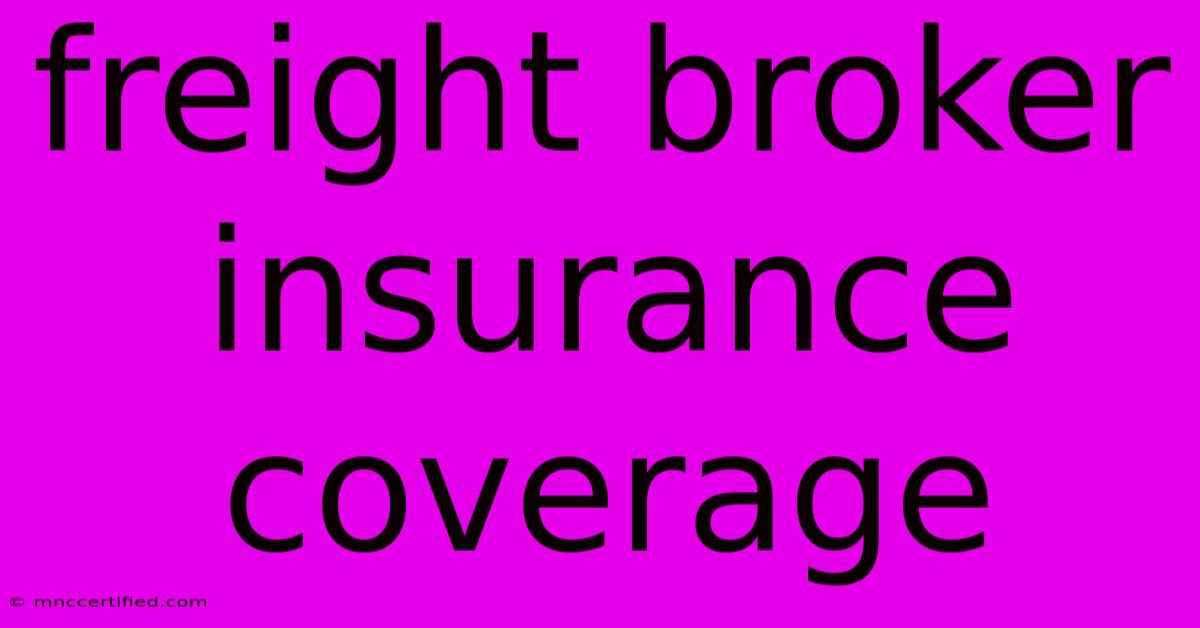Freight Broker Insurance Coverage

Table of Contents
Freight Broker Insurance Coverage: A Comprehensive Guide
Finding the right freight broker insurance coverage is crucial for protecting your business from potential financial losses. The trucking industry is inherently risky, and as a freight broker, you're exposed to various liabilities. Understanding the different types of coverage and their importance is key to operating successfully and mitigating risk. This comprehensive guide will walk you through essential freight broker insurance policies and help you make informed decisions.
Why Freight Brokers Need Insurance
As a freight broker, you're not directly responsible for the physical transportation of goods. However, you're legally liable for your actions in facilitating the shipment. A single accident or legal claim can cripple your business without adequate insurance protection. Key reasons why comprehensive insurance is a necessity include:
- Protecting your assets: Insurance safeguards your personal and business assets from financial ruin due to lawsuits, accidents, or other unforeseen events.
- Maintaining client trust: Clients want to work with brokers who are financially responsible and insured. Lack of insurance can damage your reputation and lead to lost business.
- Meeting legal requirements: Depending on your location and the specifics of your operations, certain insurance coverages might be legally mandated.
- Peace of mind: Knowing you have the right insurance in place allows you to focus on growing your business without the constant worry of potential liabilities.
Essential Freight Broker Insurance Coverages
Several types of insurance are essential for freight brokers. Let's explore the most important ones:
1. General Liability Insurance
This is a cornerstone of any freight brokerage business. General liability insurance protects you against claims of bodily injury or property damage caused by your business operations. This could include incidents on your premises, mistakes in your contracts, or advertising injury. It's crucial for covering potential lawsuits arising from your brokering activities.
2. Errors and Omissions (E&O) Insurance
Freight brokers frequently deal with complex contracts and regulations. Errors and omissions (E&O) insurance protects your business against claims arising from mistakes or negligence in your professional services. This includes failing to secure proper transportation, errors in documentation, or missed deadlines that lead to financial losses for your clients.
3. Cargo Insurance (Optional but Highly Recommended)
While you don't physically handle the cargo, you are often responsible for its safe transit. Cargo insurance protects against loss or damage to goods while in transit. While not always legally required for brokers, it demonstrates professionalism and protects your clients' interests, leading to stronger business relationships. Consider offering this as an added service to your clients for a fee.
4. Workers' Compensation Insurance (If Applicable)
If you employ drivers or other staff, workers' compensation insurance is a legal requirement in most jurisdictions. This coverage protects your employees in case of work-related injuries or illnesses.
Choosing the Right Coverage and Provider
Selecting the appropriate freight broker insurance requires careful consideration. Factors to consider include:
- Your business size and operations: The scope of your operations will influence the level of coverage you need.
- Your risk profile: Businesses operating in high-risk areas or handling high-value shipments may require higher coverage limits.
- Your budget: Insurance costs can vary significantly based on coverage levels and risk assessment.
- Insurance provider reputation: Choose a reputable provider with a proven track record of claims handling and customer service. Obtain quotes from multiple insurers to compare pricing and coverage options.
Off-Page SEO Strategies for Ranking Higher
To improve your website's search engine ranking, implementing off-page SEO strategies is crucial. This includes:
- Building High-Quality Backlinks: Secure backlinks from reputable websites within the freight and logistics industry. Guest posting on relevant blogs and participating in industry forums can help you achieve this.
- Social Media Engagement: Engage actively on relevant social media platforms, sharing valuable content and interacting with your target audience.
- Online Directory Listings: List your business on relevant online directories to increase your online presence and visibility.
- Industry Networking: Attend industry events and build relationships with other professionals to boost brand awareness and credibility.
By implementing both on-page and off-page SEO strategies, and ensuring you have the right freight broker insurance coverage, you'll be well-positioned to protect your business and thrive in a competitive marketplace. Remember, proactive risk management is a key ingredient in the success of any freight brokerage operation.

Thank you for visiting our website wich cover about Freight Broker Insurance Coverage. We hope the information provided has been useful to you. Feel free to contact us if you have any questions or need further assistance. See you next time and dont miss to bookmark.
Featured Posts
-
Monday Morning Flood Watch Potential Record Rain
Nov 18, 2024
-
I M A Celebrity 2024 Show Length And Finale
Nov 18, 2024
-
Dublin Airport Death Personal Tragedy
Nov 18, 2024
-
Heat N Bond Iron On Adhesive Lite
Nov 18, 2024
-
Who Is Dean Mc Cullough Itv 2024
Nov 18, 2024